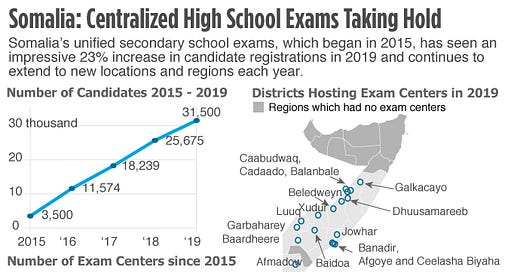Somalia: Centralized High School Exams Taking Hold
Despite vested opposition, government-led exams registered record growth in candidate numbers each year.
In June 2015, Somalia relaunched unified high school examinations for the first time since the government collapsed in 1991. The exercise, however, attracted a paltry turnout of around 3,500 students out of the estimated 17,500 in Mogadishu alone at the time.
The failed start happened after the Ministry of Education led by Dr. Khadra Bashiir Ali and 12 private education networks controlling more than 500 schools in south and central Somalia failed to reach a much-anticipated agreement to transition the country into unified exams – leading to a massive boycott called for by the education network leaders.
Private education networks were formed by local business leaders to fill the void left by the government. Over time, the networks created a cartel-like chokehold over the entire education system. They resisted any form of regulatory supervision or reform. Each network operated its own set of scattered, incoherent and low quality curriculums, resulting in the proliferation of substandard examinations and certifications.
Progress: Centralized Examinations Taking Hold
Despite vested opposition, government-led exams were, since then, not only held successfully each year but also registered a record growth in the number of candidates, schools, districts, and regions joining the national examination system.
For example, the number of candidates sitting for government exams in the second year, i.e., 2016, rose by more than 230%, while each subsequent year saw enrollment numbers increasing by an average of over 40% compared to the previous year.
Today, 5 years later, over 31,000 students are taking the gov’t exams in over 120 exam centers across 10 out of 18 regions in the country.
Consolidating the Gains and Going Forward
Somalia’s political landscape is fraught with peril. Backlash from vested interests with deep tentacles in the gov’t routinely undermine efforts by new ministers to introduce reforms. Many initiatives falter at the first hurdle. The success of the education ministry in navigating these precarious set ups and how it had managed to usher and consolidate a new era of trusted service delivery must be celebrated and emulated. Repeatable lessons should be extracted and documented as it may help other ongoing nation-building efforts.
Now, 31,000 students sitting for high school exams in a country with more than 14 million people is really a far cry from the required numbers. The government needs to continue curriculum reform, improve the quality of the examination system, and reach out to new schools and state authorities through dialogue & patient consultation. It’s also important to acknowledge that progress happens in steps and, in Somalia’s case, in zigzags that often seem fruitless. Officials need to keep forging ahead, achieving milestones, and inspiring the nation with tangible results.
Students and parents who had put their trust in the government’s nascent attempt at centralized national exams are true examples of early believers. Fast followers constitute a critical constituency that deserves special attention. They must NOT be let down. Their success and the government’s prospect for success, as it aspires to reclaim legitimacy and role in service delivery, are intricately tied together.




